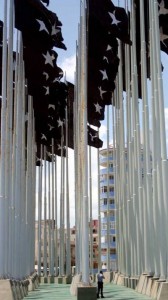
An article published by the official Cuban press (Granma, Tuesday June 15, 2010, front page) reports a collateral appeal, or habeas corpus, filed on behalf of Gerardo Hernandez, one of the five Cubans imprisoned in the United after being tried on charges of espionage, as “the final legal recourse for his case,” under the judicial system of that country.
It seems no coincidence that they have recently taken up the issue of five State Security combatants imprisoned in the U.S., in an apparent effort to minimize, in the eyes of public opinion, the question, in turn, of the political prisoners in Cuba and the controversial talks between the government and the Catholic authorities, which have captured the public’s interest in recent weeks. Collaterally, they insist on establishing some form of subordination between the potential release of the Cuban prisoners from the Black Spring and the return to the island of the above-mentioned spies, so that, once again the media minutely obsesses with notes about the five “heroes” of the regime’s reckoning. It is not idle, however, to take advantage of this juncture to point out the abysmal difference between the case of the five confessed spies, captured during Operation Wasp, and that of the peaceful journalists imprisoned by the Cuban dictatorship in March 2003, not to mention the marked contrast between the two cases relative to the considerable resources spent on the Cuban government’s campaign to release the Five. To wit: the very expensive lawyers; travel and per diem for family members who have come from around the world; the national and international crusade that has mobilized money and agents in the four corners of the globe; as well as the immense propaganda campaign; all of which is explicitly covered almost entirely with State funds without any consultation with taxpayers.
Nor do they skimp on the resources invested by the government in relation to the 75 political prisoners of the Black Spring, although in a completely opposite sense: mobilization of the repressive forces to trample the Ladies in White; privileges and incentives for their most loyal henchmen; the propaganda apparatus set in motion to slander and demonize the political prisoners and their families as well as the whole civic movement that supports them. All this without counting the political cost and the demoralization caused by this repression, the death in prison of Orlando Zapata, and the current hunger strike of Guillermo Fariñas.
Apart from this brief summary, there is still an additional critically valid question: if the Cuban government has always declared the imprisonment of their spies by their northern neighbor to be unjust (and even “illegal”); if they insist they were sentenced after a process that was “rigged” and markedly political against five “anti-terrorist fighters,” as they try to convince international public opinion and as they have broadcast in the national catechism; if, in short, the American judicial system is so “corrupt” and “subordinated to the Miami Cuban-American mafia”… How is it possible that the government of the Island is allowed to legitimize its own system by appealing to the recourse that system offers? It is not immoral to demonize and criticize the U.S. Justice system and at the same time lower oneself to appeal to it? Could it be that the five imprisoned spies are politically more useful to the Cuban government than to the anti-Castro groups in Florida?
Clearly, the Cuban authorities display an unlimited impudence by not discriminating between the unjust and the legitimate. So twisted are they, that we will see them once again ranting against the U.S. system to which they now appeal, should they get a new denial of the last legal recourse they have just presented before the Federal Court in Miami.
To comment on this post, please visit:
Miriam’s Blog: Sin Evasion / Without Evasion
